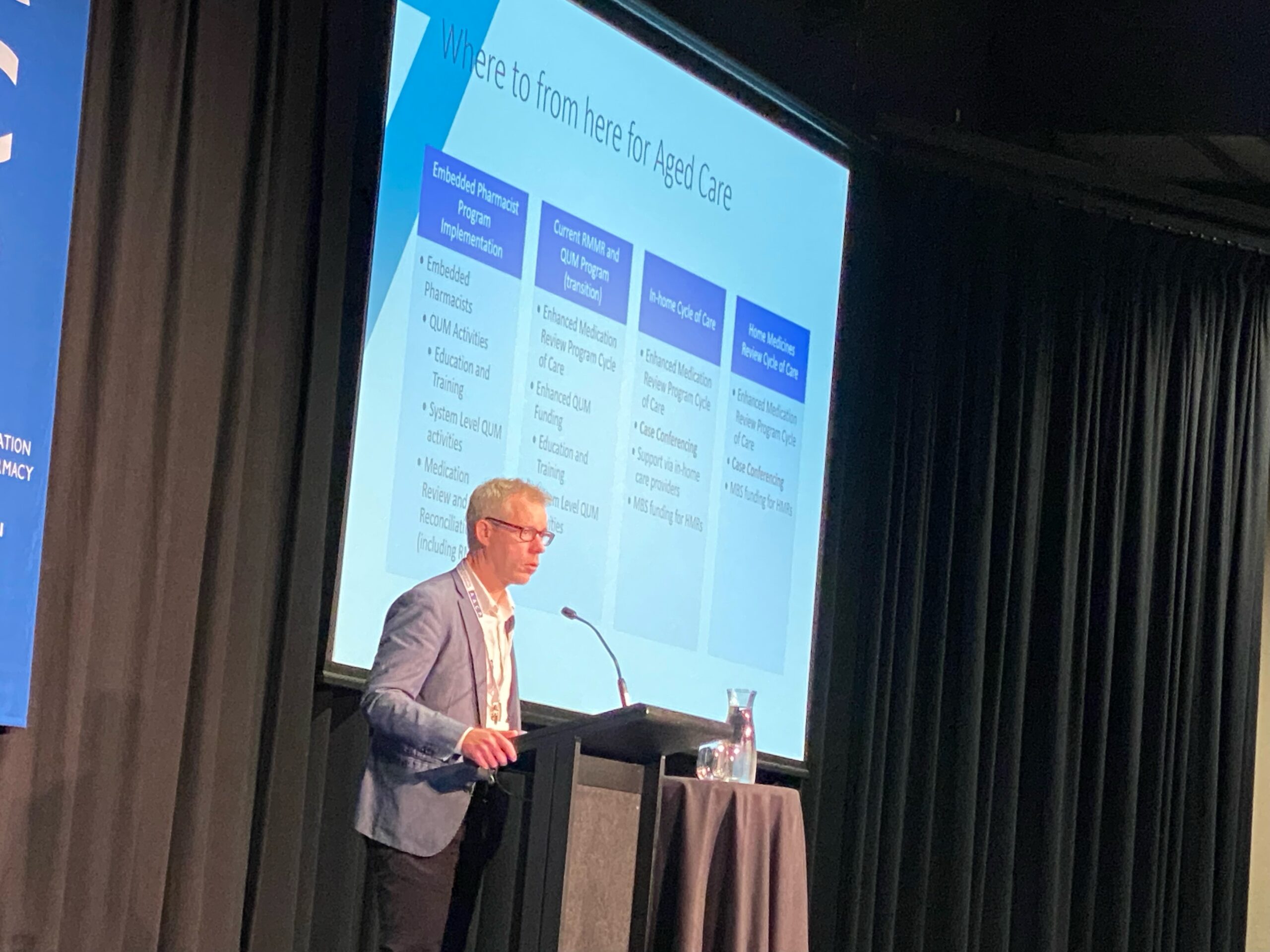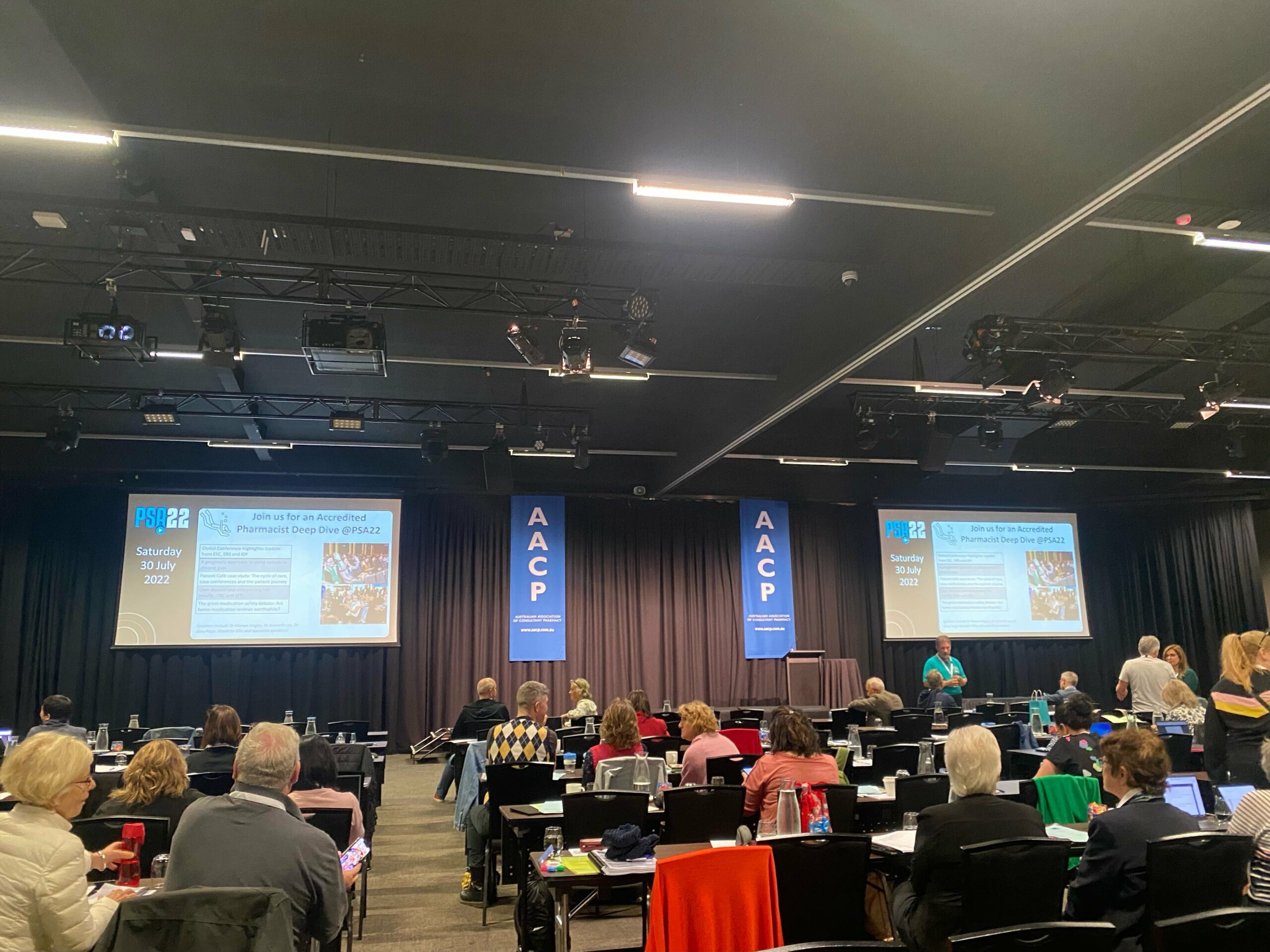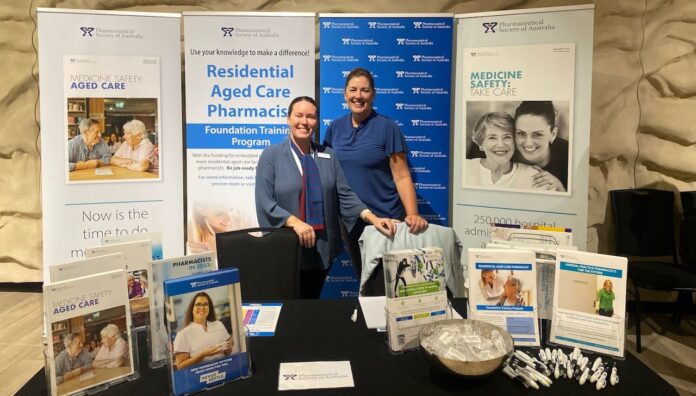
With demand for pharmacists in aged care set to rise, there has never been a better time to broaden your scope of practice through accreditation.
The Australian Association of Consultant Pharmacy (AACP), which held its popular annual seminar ConPharm from Jun 17–19 over last weekend at Sea World on the Gold Coast, announced Dr Shane Jackson as new Chair of the AACP.
ConPharm 2022 comes as the profession celebrates 25 years of accreditation, with Debbie Rigby FPS, Lesley Taylor MPS and Roger Kilpatrick among the first pharmacists to be accredited by the AACP to conduct medication reviews in 1997. In the past quarter of a century, the role has evolved by improving the lives of patients and opening up new career paths for pharmacists, including in general practice, Aboriginal Community Controlled Health Organisations and aged care.

With the news that government-funded residential aged care facilities will receive $345.7 million in funding to employ an on-site pharmacist or pharmacy services from next year, outgoing PSA National President Associate Professor Chris Freeman said accreditation is more important than ever.
‘Accredited pharmacists make up an important part of the pharmacy profession ecosystem, and medication management reviews are an evidence-based clinical service proven to enhance the safe and effective use of medicines,’ he said.
‘Quite simply, we need more accredited pharmacists and more medication reviews being done.’
AACP Board Member and accredited pharmacist Sue Edwards agreed, recommending pharmacists study pathways to accreditation offered via the AACP and the Society of Hospital Pharmacists of Australia (SHPA) by both looking at their websites and contacting them to ensure full understanding.
PSA offers Stage 1 accreditation, the first step in the two-stage accreditation assessment process.
‘Accreditation is important to demonstrate pharmacists meet standards for undertaking comprehensive medication review, in turn increasing trust and confidence in them among the medical profession and public,’ she said.
What accreditation offers
For consultant and general practice pharmacist Deborah Hawthorne MPS, gaining accreditation provided a much-needed boost to her career.
‘It reignited my love of pharmacy practice and has allowed me to focus on the clinical side of pharmacy within the primary care sphere,’ she said.
‘I get to create long-lasting relationships with patients, healthcare providers and other stakeholders, while at the same time improving health literacy, medication safety and health outcomes for the patients I encounter.’
The skills she has gained extend well-beyond aged care and Home Medicines Reviews. ‘[It] helps open up doors in community pharmacy, hospital pharmacy, research, public health, education and other embedded roles in GP and disability spaces,’ Ms Hawthorne said.
Ms Rigby, an Accredited Advanced Practice Pharmacist and Chair of PSA’s Interdisciplinary Team-Based Care Community of Specialty Interest, said accreditation is ‘essential’ to show pharmacists are ‘appropriately skilled and experienced to conduct comprehensive medication reviews’.
‘Completion of training and accreditation is a landmark event for pharmacists, which they are rightfully proud of,’ she said.
‘While pharmacists have a sound knowledge of medications, it is application of knowledge and clinical reasoning, together with interprofessional communication skills, that differentiate accredited pharmacists from some other areas of practice.’
For Toni Riley MPS, accreditation – and re-accreditation – is about pharmacists having a recognised role in medication management.
‘Most important is the ability of an accredited pharmacist to provide an in-depth clinical review, while being completely separate from the supply of medicines,’ she said.
Top tips to accreditation
The first step to gaining accreditation is to set a goal, Ms Rigby said.
‘In reality, accreditation could be achieved in as little as 2–3 months. But trying to fit accreditation into a busy professional and personal life can be challenging, and therefore setting a realistic timeline is essential,’ she said.
Identifying a mentor who can provide valuable advice and support is also important.
‘Finding an accredited pharmacist to shadow for real-life experience will reinforce whether this type of pharmacy practice meets your goals and professional satisfaction,’ Ms Rigby said.
Ms Riley said learning from others’ experience is ‘invaluable’. ‘[Also], be prepared to learn new skills beyond your current clinical knowledge and to embrace the concept of life-long learning enthusiastically,’ she said.
‘Whether you are fresh out of university or a seasoned pharmacist, the accreditation process is an educational experience that will enhance your pharmacy skills,’ Ms Hawthorne advised, saying ‘just do it!’.
Conducting medication reviews ‘enhances inter-professional relationships, improves the quality use of medicines and impacts positively on health outcomes,’ according to Ms Edwards, while accredited pharmacists can also use these skills and knowledge in other areas of practice.
She also recommended undertaking as much clinical CPD as possible, and attending face-to-face education sessions designed to build skills for medication review such as Pharmeducation masterclasses, PSA22 masterclasses as well as ConPharm.
Come to PSA22 for the Accredited Pharmacists Deep Dive and 3 days of high-quality robust Continuing Professional Development, platforms for innovative practice and strategic networking opportunities.

ConPharm 2022
The 18th Annual Consultant Clinical Pharmacy Seminar ConPharm held over last weekend was an opportunity for newly-accredited pharmacists and those undergoing the usually 12-month accreditation process, to meet gain inspiration from more experienced colleagues involved in aged care.
Among topics for continuing education were improving medication review report writing, aged care, pain, antimicrobial, corticosteroid and anticonvulsant stewardship.
PSA National Board Vice-President and Chair of the AACP Board Dr Shane Jackson was among the presenters at ConPharm on aged care and the future of on-site aged care pharmacists.
‘There has never been a more important time to be an accredited pharmacist,’ he told delegates and described the new funding of the on-site aged care pharmacist program as ‘the single biggest investment in medicine safety in aged care, in Australia, ever.’ He encouraged accredited pharmacists from across the country to support on-site aged care when it launches in January 2023.
And taking over the mantle of last year’s winner Dr Manya Angley FPS, this year’s AACP MIMS Consultant Pharmacist of the Year was announced as Robyn Saunders MPS who told ConPharm: ‘I encourage all pharmacists to elevate our standing. We are the medicines experts.’



 Professor Margie Danchin[/caption]
Professor Margie Danchin[/caption]

 Dr Peter Tenni[/caption]
Dr Peter Tenni[/caption]
 How should we deprescribe gabapentinoids, according to the Maudsley Deprescribing Guidelines[/caption]
How should we deprescribe gabapentinoids, according to the Maudsley Deprescribing Guidelines[/caption]



 Pharmacists have always prescribed, but they have the potential to prescribe much more
Pharmacists have always prescribed, but they have the potential to prescribe much more




